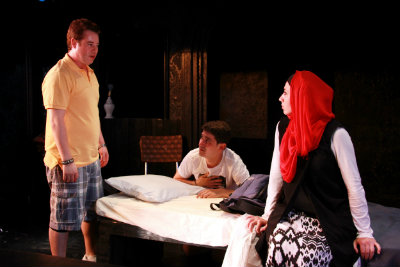Israel Horovitz One-Acts
Produced by Ethikos Productions

Hunter Thore, Dan Catomeris, and Julie Asriyan. Photo by Daphne Schmon.
BOTTOM LINE: The three very different one-acts by the veteran playwright revolve around young adults coming to grips with the real world and traverse the spectrum from tame to shocking.
Israel Horovitz has been writing plays for over a half century. For 35 of those years his most famous play, Line, has been running at the 13th Street Repertory Company in New York City (touted as the longest running play in New York history). However, the bulk of Horovitz’s writings have been one-acts, many of which bring about a controversial tone, such as his 1968 hit play The Indian Wants the Bronx starring a young Al Pacino. So, the fact that Mr. Horovitz is eager to hand over a brand new script for a world premiere to a three month old company says something about his belief in young theatermakers of today. Ethikos Productions does well to honor the legacy of Horovitz and inject some youthful energy into three one-act plays, old and new.
Mia Walker, former resident director of The Flea Theater, returns to the underground space at The Flea to direct three of Horovitz’s plays in Ethikos’s inaugural production. Plays include The Bump (world premiere), It’s Called the Sugar Plumb, and Beirut Rocks. In excerpts from an interview with Walker and Horovitz, the veteran playwright expresses his fear when he learned of Sugar Plumb being produced since this was a play he wrote when he was 17 years old. What’s changed for Horovitz since then? At 72 years old, he now spends more time asking, “What does an audience need?”
If The Bump is any indication, a 2012 audience needs a whimsical, intellectual romantic comedy set in a passport office. It’s a classic study of missed connections in which the characters, played by a rotating pair of actors (charmingly performed by Lyle Friedman and Dan Catomeris on the evening I attended) are both waiting for their number to be called. After some conversation they begin to discover common interests and backgrounds. The list goes from consequential, to contrived, to flat out unfathomable. Horovitz enjoys playing with audience expectations which are on display in this short, intriguing piece. The language and outlandish coincidences resemble a How I Met Your Mother plot, but allow for these characters to reveal themselves and their desires through impulsive actions in a short amount of time.
Horovitz’s early play, It’s Called the Sugar Plumb, is the most textually interesting (and complicated) play of the evening. In this piece, a novice Horovitz tries several different voices on for size. Sugar Plumb has the fragility of Tennessee Williams’s characters and the hyper reality-bending of Pinter. It focuses on a young student in Cambridge in the 1950s named Wallace Zuckerman (Brian Rice) who has recently hit and killed another student with his car by accident (maybe) and the dead student’s fiancée (Jenna Ciralli) who has come to confront the killer. We learn that Zuckerman is a sort of straight-laced outsider (the perfect serial killer type) and is somewhat enthusiastic over the attention he’s garnering for the accident. The unlikely couple gets to know one another, leading to unpredictable outcomes and revelations. Unfortunately Walker and her cast never seem to tap into exactly which style they want to use to approach this play and mostly come off as ingenuine to the circumstances. Rice and Ciralli never appear to be on the same page together and ultimately this piece plays as under-rehearsed. However, I don’t believe Horovitz’s claim that this play is less significant because of how young he was when it was written; there are opportunities abounding in this dark comedy that could certainly be mined with a little more delving.
In Ethikos’s strongest offering of the night we get Horovtiz’s 2007 play, Beirut Rocks, surrounding the Hezbollah bombings in Beirut in 2006. This play originally received a controversial response and critical praise. The play centers on four American students in Lebanon amidst the height of the bombing, confined to a hotel room acting as a safe house. Horovitz’s mastery shines through as he uses the conceit to throw together young, intelligent yet impressionable minds into a claustrophobic setting with life and death consequences. He gives us characters who are instantly likeable and recognizable in this complicated setting and once again turns our expectations on end as a Bronx-born Jewish student (brilliantly and honestly portrayed by Hunter Thore, giving the most dynamic performance of the evening) and a Palestinian American (an emotionally wrought Julie Asriyan) come to blows over their beliefs. Walker’s gifts are on display in this wonderfully structured and staged rendering of a powerful play which offers clear problems and no solutions.
Overall, these three plays create a fine freshman offering for the new off off Broadway company. Walker and her actors bring resonance to these plays more often than not over the course of the evening, culminating in the stand-out Beirut. That play also has the strongest costuming of the evening, while designer Ashley Farra struggles in the other two pieces with how to handle contrasting the all black space. Tasha Guevara’s sound design brings the production quality of each piece to a higher level.
While there are better Horovitz plays to have chosen than a couple of these, it is clear that Walker's (and Ethikos’s) passion for these plays is unquestionable. The through-line in all of these one-acts is coming-of-age in a world more complicated than expected. Even at 72, Horovitz is still evidently probing the vitality of that key moment in every young person’s life when they realize their words and actions now affect more than just themselves.
(Israel Horovitz One-Acts plays at The Flea Theater, 41 White Street, between Church and Broadway, three blocks south of Canal, through July 15, 2012. Performances are Thursdays through Sundays at 7PM. Tickets are $20 and are available by calling 212-352-3101 or online at theflea.org.)

